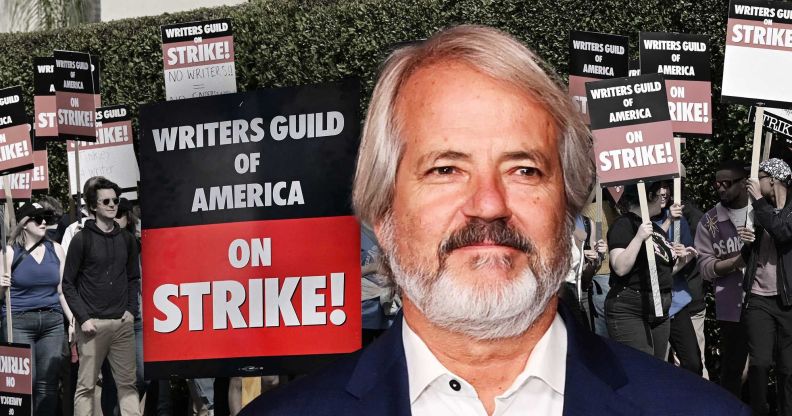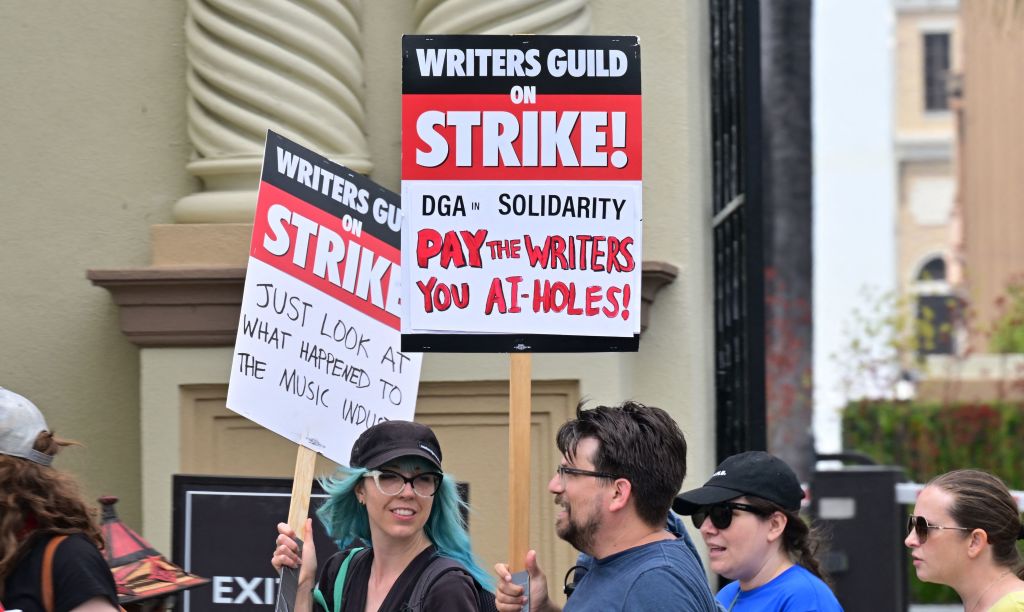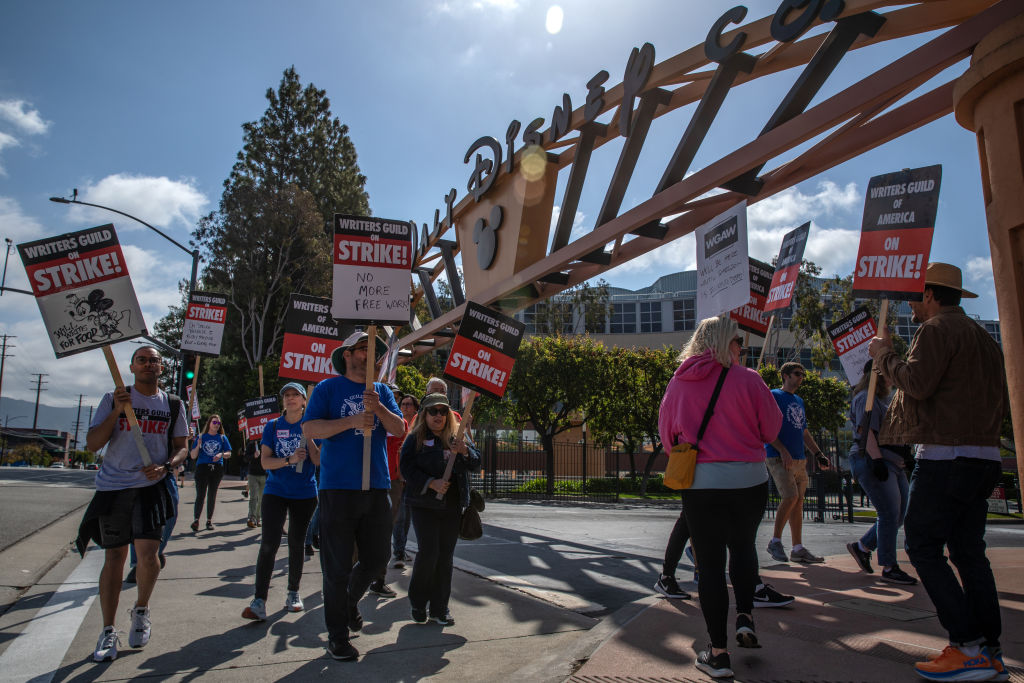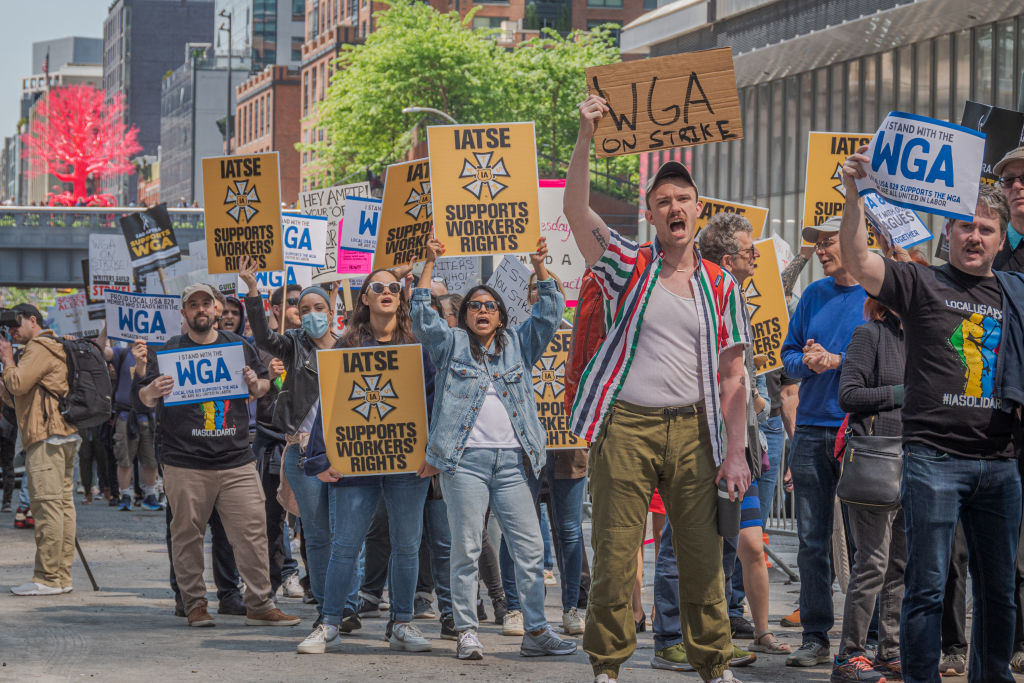Silo creator Graham Yost on why ‘struggling’ writers needed to go on strike

Graham Yost, creator of Apple TV+ show Silo, on the writers’ strike. (Getty/PinkNews)
The message from the Writers’ Guild of America is clear: as the TV and film industry increasingly moves towards streaming platforms, writers are suffering the consequences.
Right now, the writers who bring the public their favourite television shows and films are on strike. There are a multitude of reasons behind the industrial action – from the rise of streaming to AI – but at the end of the day, it mostly comes down to pay and worsening conditions.
The Writers’ Guild says weekly writer-producer pay has declined four per cent over the last decade. When adjusted for inflation, that decline amounts to a 23 per cent drop in pay.
Graham Yost, a seasoned writer and showrunner who has just launched his new series Silo on Apple TV+, says conditions have been gradually getting worse for writers over the last decade. Writing teams are smaller, they’re being given less time to pull a season of television together and they’re not getting paid what they should be.
“The things we’re asking for are so simple and not at all groundbreaking,” Yost tells PinkNews. “In fact what we’re trying to do is stem the tide that is trying to push writers out of their position in this business and just make it a gig economy so people are hired by the day, by the week, instead of by the show, by the job.”

Yost is in a relatively unique position – the strike began just as the first season of Silo launched on Apple TV+. The dystopian drama debuted to critical acclaim and a second season is already in development, but work has halted for now as writers demand better conditions.
“I’m also a producer on the show and technically I could still be doing producer things – advising on costumes, casting, editing – and I was planning to probably do that, even though the Writers’ Guild had asked showrunners to just cut ties,” Yost says.
“Then I read the document of what the Writers’ Guild has demanded, and what the TV studios, film studios, networks and streamers replied with, and when I read it, it was just, well, that’s it – I’m not doing anything because this is so outrageous.”
Yost’s frustrations with the system are borne out of personal experience. After the last writers’ strike in 2007, he worked on the FX show Justified, where they had a writers’ room of around 10 people for a 13-episode season. Getting the same number today is increasingly difficult.
“When I did the math on the amount of time we had per episode on Justified, it was a little under the three weeks that the guild is asking for now per episode – but it was close enough,” he says.

Yost loves working at Apple TV+, which he says has been a supportive place to create a new show – but he still had to push to get the writing staff and time he needed.
“I’m 63 years old. I’ve been doing this a long time. I have a certain reputation in the business that you would think – I would think with my arrogance – that I would get what I ask for. [But] it was hard, and that’s me.
“So, you get a young showrunner, they want to have one writer per episode, they’ll just be told no. You want three weeks per episode? They’ll be told, yeah you’re getting a week and a half.”
Poor pay is at the centre of writers’ strike, says Graham Yost
A lack of time and resources isn’t the only problem – there’s also the fact that writers’ pay is dropping. If you’ve been following the writers’ strike, you’ll probably have heard the term ‘residuals’ thrown about.
‘Residuals’ are akin to royalty payments for screenwriters. Once upon a time, a second airing of an episode would earn a writer an additional pay cheque – but that’s all changed with streaming.
“People could sort of plan their economic life based on the fact that they were going to get that second play,” Graham Yost says. “But if it’s on Apple or Amazon or Netflix there is no second play – it’s playing all the time.
“So how do we make it so that if something is successful, if a show gets a lot of eyeballs for one of the streamers, how can that be rewarded and how can that help writers?”

Stretched resources and less money also means that it’s getting harder for writers to move up the ranks. When Yost was working on Justified, the writer of an episode would get to work on set with the wider production team.
“If you’ve got a small writers’ room and you’ve got four writers trying to write 10 episodes, you can’t afford to send someone,” Yost says. That stops writers from getting the hands on experience to work their way up to eventually become a showrunner themselves.
When taken in isolation, the problems might seem easy to fix – but together, they represent a threat to the foundations the industry is built on. After years of declining conditions, Yost says it’s time for writers to demand better.
“It used to be that being a writer in Hollywood was a pretty nice gig. Now it’s basically that we’re just struggling to be in the middle class. I’m not – I’m 63 and I’ve been doing this a long time and I’ve made a good living, but for people starting out, it’s gonna be very tough.”
The last writers’ strike lasted for 100 days and speculation is already mounting that this one could go on for longer. If strike action lingers, scripted television will eventually start to dry up. Shows will be delayed, and some might even be scrapped entirely.

“I’ve got a guy who directed three episodes of Silo – they were about to start production on a new thing next week and they’re going to go ahead with it but the writer may not be able to be there and that’s not going to be good for that show.
“So then what happens to that show? Does it get cancelled after the first season? It’s those shows that are on the bubble as they say, that are in the middle zone, they might really suffer.”
Yost loves television, and he hopes studios and streaming platforms will come to see that writers are simply looking to be treated fairly.
“I love the work I get to do and I hope I get to get back to doing it soon. We all do. We love being writers. We just want to write and we want to be paid fairly and we want to protect for the future – and we want to give our employers what they want, which is a good show.”

